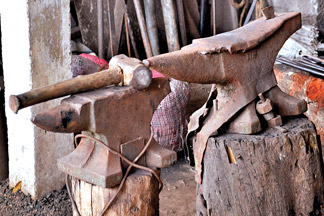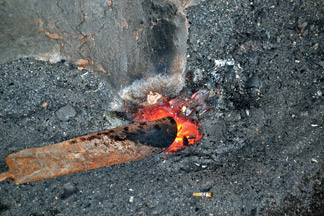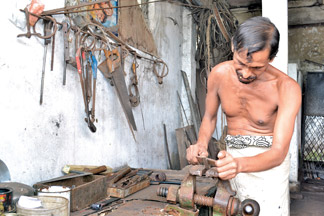
Blacksmiths preserve a unique industry
Men of steel keep industry
alive
By Ananda KANNANGARA
 The widely known `Oxford Dictionary' describes the word `WEAPON' as
an object such as a knife, gun or a bomb. Weapons are generally used for
fighting or attacking people. There are ranges of weapons in the world
such as nuclear, chemical, lethal or deadly weapons. In addition, there
are human friendly weapons such as knives, kattys, axes, crowbars,
sickles, rakes and mamoties and they are used by people as kitchen and
garden utensils. The widely known `Oxford Dictionary' describes the word `WEAPON' as
an object such as a knife, gun or a bomb. Weapons are generally used for
fighting or attacking people. There are ranges of weapons in the world
such as nuclear, chemical, lethal or deadly weapons. In addition, there
are human friendly weapons such as knives, kattys, axes, crowbars,
sickles, rakes and mamoties and they are used by people as kitchen and
garden utensils.
These human friendly tools are generally manufactured even in small
workshops and not located in large industrial estates.
Such workshops are located in villages and they are called 'smithies
'. The persons who are in charge of these workshops are `Blacksmiths'.
Blacksmith is a person whose job is to make and repair things made of
iron. In short Smithy is the Blacksmith's workshop.
Bellow, anvil and the hammer are the major devices used by blacksmith
to make various shapes of weapons. Bellow is used for blowing air into a
fire. Anvil is an iron block on which metal is hammered and shaped.
 |
|
Equipment in a blacksmith's
workshop |

Heating an iron bar to make a crowbar |

Sharpening a knife |

Using a bellow for blowing air |
Although plenty of blacksmith's workshops kammala (in Sinhala) were
seen in villages several decades ago, these kammalas now are hardly
found in villages due to the sophisticated electrical cutters, blades
and other gadgets that have encroached the market.
Since these latest equipment are in the market, many people believe
that these kammals and blacksmiths have dwindled. Blacksmiths workshops
which was very famous in areas including Yakkala, Kadawata, Malabe,
Weboda, Galle and Waikkala decades ago, have also become a dying
industry.
When the Sunday Observer last week visited a few kammals at Malabe,
Athurugiriya and Talawathugoda areas, a 64-year-old blacksmith,
Karunapala Gamage, said a group of students from an international school
at Kollupitiya recently visited his kammala as a part of their
educational tour.
They came to see the art of manufacturing household utensils such as
small and medium knives, coconut scrapers, axes and crowbars.
Not only children but also some teachers who were there had not seen
a blacksmith's workshop before. Some teachers were surprised to see the
art of making knives and coconut scrapers.
He said although those teachers had earlier heard about kammals in
villages, it was the first time they saw it in reality. Another
blacksmith, 54-year-old Siripala Ambepitiya who runs a workshop at
Malabe said he started his workshop twenty years ago.
"I make not only knives and crowbars, but also sickles, pic-axes and
also iron gates." He said he visit houses, hotels and large buildings to
fix iron railings.
He said the daily depends on the climate. When during rainy days the
income income becomes very low, but on some days he can earn over Rs.
4,000. He also said that many customers order table knives, large
kitchen knives and iron grills during the new year and X' mas seasons.
The owner of a blacksmith's workshop at Talawathugoda said he has
been involved in the kammal business since 1987 and there is a great
demand still for utensils made of iron. People prefer knives and
utensils made by blacksmiths and not imported knives.
Seventy-year-old Nandasena Perera who runs a kammala at Yakkala said
he started operating in 1979 and during this period he was able to put
up a new house from the income he got from his kammala.
Whatever people say, still they prefer utensils, made of iron .
That's why many customers prefer small knives, rakes and kitchen knives
made by us.
He also requested authorities to reduce the taxes of imported iron
bars and iron rods, so that they could do a better service for people.
A kammal owner at Bandaragama, Priyantha Gunaratna said he inherited
the business in 2003 from his late father and said he makes a monthly
profit of Rs. 40,000.
This is an independent job. Nobody could interfere in our work. But,
Government should help small scale kammal owners by reducing the taxes
of imported iron.
A father of three, Gamani Gamalath who owns a workshop at Kadawatha
said this has become a dying industry since the prices of iron is
increasing rapidly.
He urged the authorities to open a state owned shop, like the
Building Materials Corporation, so that they could buy iron rods and
bars at reasonable rates.
He said traders at Panchikawatta make large profits by selling iron
rods to them and it is the duty of the authorities to stop this.
Raja Sirisena who runs a kammala at Moratuwa said he earns a monthly
income of Rs. 60,000.
He said he receives large orders from hotels in the Down South and
urged the Government to start hotel construction work in Jaffna too as
it will be a help for kammal owners.
A 56-year-old, Nihal Ginige of Yakkala said he started his Kammal
industry in 1991 and earn a good profit since customers still like
locally made knives, sickels, rakes and also wheel barrows.
He said, in addition, he started making iron railings at houses and
hotels with white iron.
White iron is very expensive since traders know the demand for white
iron by customers. Therefore, he requested the authorities to reduce the
taxes of white iron.
A blacksmith, Gamage of Gampaha said, the majority of blacksmiths at
present avoid using bellows since they considered it as a difficult task
. They have got used to get fire from electrical blowers. |

